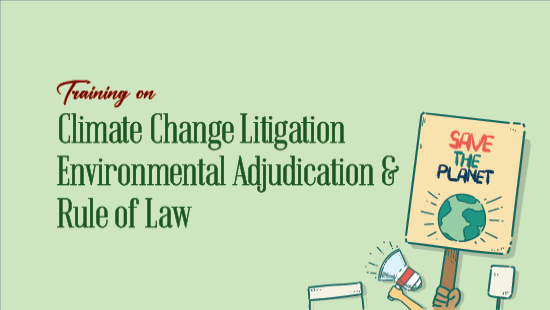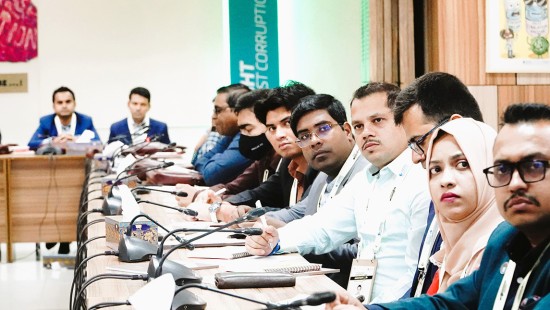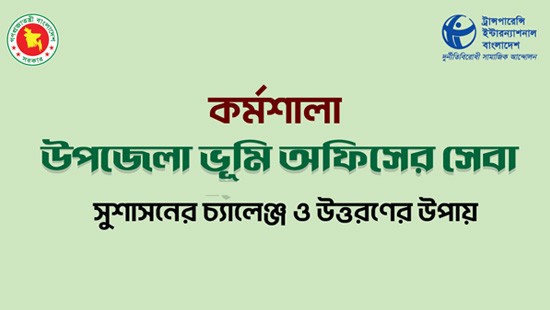Published: 11 October 2024
Corruption is a pervasive issue that undermines the integrity of governments and hinders development. To effectively combat corruption, it is essential to equip government officials with the tools and knowledge necessary to identify and address it. With this aim in mind, recently, Transparency International Bangladesh (TIB), in collaboration with the Anti-Corruption Commission (ACC), conducted a three-day training workshop on Advance Research Methodology at Proshika HRDC in Koitta, Manikganj to enhance ACC officials’ capacity for enforcing anti-corruption measures. The training is a follow-up session for 15 officials of the government agency concentrating on both theory and application of advance research process.
The Importance of Research in Anti-Corruption Efforts
Research plays a crucial role in identifying corruption, understanding its root causes, and developing effective strategies to combat it. By equipping government officials with advanced research skills, we can empower them to identify corruption, to uncover hidden patterns of corruption and expose corrupt practices that may otherwise remain undetected. Research can help to identify the underlying factors that contribute to corruption, such as weak governance, lack of transparency, and inadequate accountability mechanisms, etc.
The ACC, an officially autonomous entity of Bangladesh, plays a significant role in the country by investigating the corruption issue. The TIB anticipates that the ACC will be better prepared to identify corruption and implement stringent measures in order to eradicate it as it works to fulfill its mandate.
While inaugurating the training workshop, Muhammad Badiuzzaman, Research & Policy Director of TIB said that, ‘We believe that with thorough understanding of research processes, the ACC officials will be able to implement the learnings for ensuring increased accountability and transparency at the administrative level.’
On the first day of workshop, detailed sessions on different aspects of research took place which included the methods of data collection, data coding and transcription, data analysis, triangulation and validation, and report preparation. The training sessions were conducted by TIB Senior Research Fellow Shahzada Akram and Md Mahfuzul Haque, and Research Fellow Atanu Das.
The 15 ACC officials divided in three groups, on second day, applied their learnings through field visits in different government offices including Bangladesh Road Transport Authority, Land Office and Bangladesh Rural Electrification Board. With the data collected from the spots, on the final day of the workshop, the participating ACC officials analyzed the existing discrepancies and irregularities in the public service sector and presented their findings in line with the learnings. Participants also engaged in lively question and answer sessions over each other’s works. In conclusion, each group put forward multiple sets of recommendations to improve the service quality of those government agencies.
Key Takeaways from the Workshop
The training workshop was a success, as ACC officials have gained valuable insights into advanced research methodologies. Some of the key takeaways from the workshop include:
The power of research: Participants recognized the potential of research to make a significant impact on the fight against corruption.
Collaboration is key: The workshop highlighted the importance of collaboration between government agencies and civil society organizations in combating corruption.
Continuous learning: The ACC officials understood the need for ongoing learning and development in the field of research.
TIB Outreach & Communication Director Mohammad Tauhidul Islam emphasized the need of equipping ACC officials with enhanced knowledge on research methodology. ‘Capacity development of the ACC officials will help the ACC to become an impactful government agency that would be able to prevent corruption rightfully. We are hopeful that ACC will uncover new means of combatting and averting corruption through researches as an outcome of this workshop,’ he said.
Earlier, the TIB O&C Director hosted a special session on the significance of utilizing open data sources for corruption research and different online repositories and tools for data collection and cleaning.
Conclusion
The training workshop on advanced research methodology was a valuable step in empowering ACC officials to combat corruption more effectively. By equipping officials with the tools and knowledge necessary to conduct rigorous research, the government agencies will be able to identify and address corruption. As the fight against corruption continues, it is essential to invest in training and capacity building to ensure that government officials have the skills they need to make a difference.
The participants appreciated TIB’s effort to enhance their capacity in research field. On behalf of the ACC Officials, Deputy Director Sharika Islam thanked TIB for the theoretical and practical design of the workshop and lauded the efficiencies of the trainers. ‘With our learnings on Advance Research Methodology, we from now on can identify the limitations of researches on corruption as an outcome of the workshop.’ She also expressed hope that the newly opened research wing of ACC will perform more effectively as takeaways from the workshop will be replicated for real world application.
The three-day workshop concluded with certificate distribution among the participating ACC officials.



















